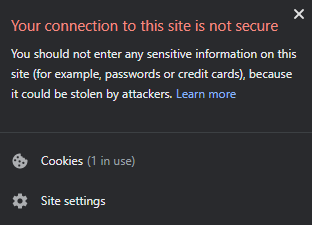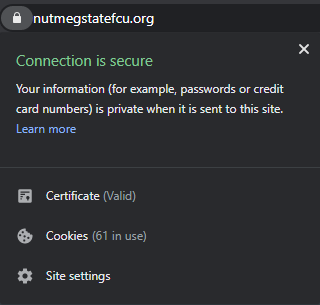Stay Protected From Online Scams
As I’m sure you know, all of us at Nutmeg are dedicated to our members and the communities we serve. I have used my blog many times before to talk about what we do to help with financial education, community events, charity fundraisers and much more. But today I want to talk about something specific that can affect every one of us. With technology constantly changing, it is more important than ever for all of us to stay vigilant and be able to identify the warning signs of online scams.
In most cases, scammers contact their victims over the phone or by email to deceive them and gain their trust. A very popular example of this is fake tech support scams where scammers pose as employees of reputable companies. By pretending to be someone who should be helping with a supposed computer problem, these scammers can quickly take advantage of their victims’ trust and obtain their personal information. Other scammers reach their victims by email or social media channels and pose as financial institutions to steal data. This is known as phishing, where scammers mainly focus on stealing your financial information and credentials. I have seen many cases of this scam during my time in the financial services industry and cannot stress how important it is to be sure that any messages you receive are real and secure.
With Valentine’s Day in mind, I’d also like to touch on a specific type of online scam that focuses on dating and relationships. “Sweetheart scams” happen when a scammer forms an online relationship with a victim to get access to personal financial data. While this can happen to anyone, scammers normally target people above the age of 45. This makes it very important to watch out for our loved ones if they use online dating applications. Always be sure that any romantic interests you meet online are legitimate people. If at any point you are asked to send money or financial information to someone you have been talking to online, you may be the target of a sweetheart scam.
Even with all of these scams happening frequently, there are still many ways for you to stay safe online and in your daily life. It is always important to watch what you are doing on the internet and make sure that all the websites you visit are secure. An easy way to identify a secure website is by checking its URL in your web browser. If it begins with https, the website is secure and minimizes the risk of fraud by protecting any data sent through it. Scammers will still take any opportunity to obtain your data, however, including making fake websites that look like they belong to real companies. But if you remember the https rule, you will be able to stay protected and identify these fraudulent sites easily.
Below are images of secure and unsecured websites. The websites you visit will show a symbol next to the URL (Google Chrome). Clicking on this symbol will display more details about the website, including if it is secure or unsecured. For example, a secure website will always display a padlock symbol next to its URL.
In addition to fake or unsecured websites, be sure to also avoid any other forms of contact that look suspicious. Blocking unsolicited calls and deleting emails from suspicious senders are easy ways to stop scammers before they can even reach you. But most importantly, remember that your financial provider will never ask you for your personal information online. This is one of the biggest red flags for online scams that I believe we should all be aware of.
As always, the safety of your personal data is a top priority for all of us at Nutmeg. We are here to answer any questions you may have about keeping your information protected and secure. If you ever believe your identity or funds have been stolen because of an online scam, contact us immediately and we will help restore your identity as quickly as possible. For more information, or to learn more about our ID Theft Protection service, click here. I hope this information has been helpful to you and keeps you and your loved ones safe from online scams in the years to come.
Sincerely,
John Holt
President & CEO


